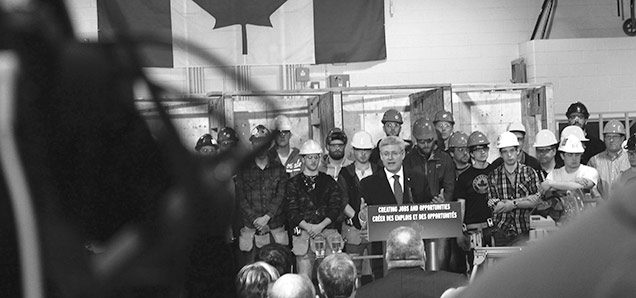The next big thing: Battle lines drawn for federal election
 CREDIT: STEPHANIE LAI
CREDIT: STEPHANIE LAIHarper's government has delivered on some things, but is that enough to stave off the Liberals?
With most teachers back in classrooms at the beginning of the month, only one group of public employees was yet to get back to work. The federal government came together in the House of Commons for the first meeting of the fall 2014 session on September 15.
After spending the precious few months Canadians generously call “summer” in their respective home provinces, Members of Parliament assembled in Ottawa dedicated to minimizing bad publicity between now and the federal election tentatively scheduled for October 2015.
Prime Minister Stephen Harper and opposition leader Thomas Mulcair announced legislation they’ll be introducing in the near future, but they have an uphill battle ahead to catch Liberal leader Justin Trudeau in the polls.
The federal Liberal Party was an unmitigated train-wreck from the time of Jean Chrétien over a decade ago until Trudeau arrived. An interim leader who couldn’t win re-election and two successive candidates that never resonated with Canadians forced the Liberals to surrender the title of opposition party to Jack Layton’s NDP.
On that note, Pierre Trudeau’s son arrived on the scene. He brings youth and charisma to the floundering Liberal Party that was suffering from a distinct lack of both characteristics. Despite earnest attempts by Sun News to portray Trudeau as condoning terrorism and being anti-Semitic, he continues to lead in polls conducted in the major population centres of the country.
If the ascendancy of the Liberal Party is remarkable, it can hardly overshadow the political revolution began by the late former Leader of the Official Opposition, Layton. The innumerable eulogies dedicated to him after his passing celebrated his passion for inclusivity and his embodiment of the NDP’s values.
It was under Layton’s guidance that the NDP stormed the 2011 federal election, snatching up 103 seats compared to the mere 36 they’d held before. Public support for the party waned in the transition to the new leadership of Mulcair, who is proposing a federal minimum wage of $15 per hour as his backfrom- summer headline. The minimum wage would only apply to federally regulated industries, which render it an inconsequential sideline that won’t generate much debate or criticism.
The prime minister is opening the session of Parliament with bills that are intended to “reduce red-tape” and secure a free trade agreement with South Korea. Legislation and announcements of this nature tend to have the wonderful dual effect of encouraging the financial markets and boring voters.
Harper’s government certainly won’t be campaigning on its environmental or ethical track record given the omnibus bills it’s rammed through parliament during its majority. The CBC published an article in March that included excerpts from a speech delivered by a young Stephen Harper in 1995 when he inquired, “How can members represent their constituents on these various areas when they are forced to vote in a block on such legislation…?”
Almost two decades later, he’s going to face an electorate whose input he has spent his entire time in office ignoring. The Harper government has delivered on their economic and financial commitments but whether that will be enough to shelter them from the Liberal storm has yet to be seen.
Editorial opinions or comments expressed in this online edition of Interrobang newspaper reflect the views of the writer and are not those of the Interrobang or the Fanshawe Student Union. The Interrobang is published weekly by the Fanshawe Student Union at 1001 Fanshawe College Blvd., P.O. Box 7005, London, Ontario, N5Y 5R6 and distributed through the Fanshawe College community. Letters to the editor are welcome. All letters are subject to editing and should be emailed. All letters must be accompanied by contact information. Letters can also be submitted online by clicking here.













